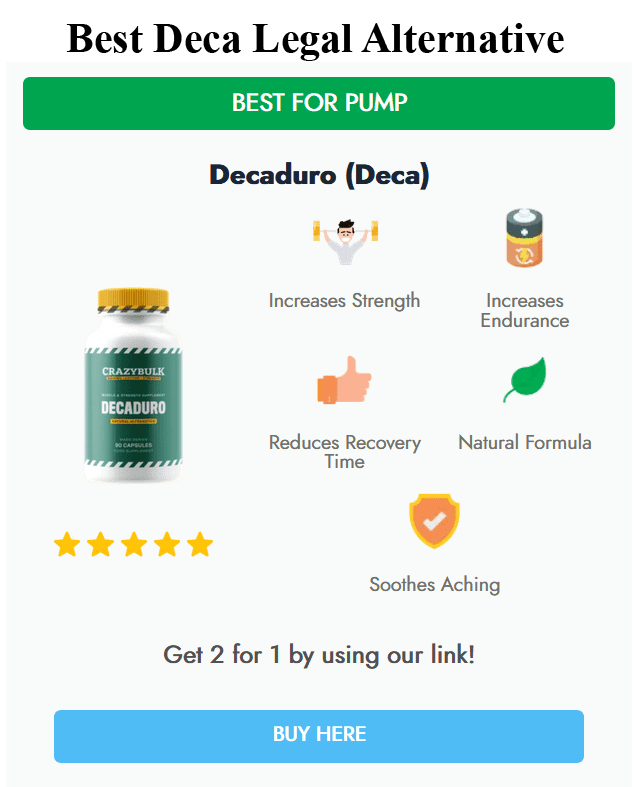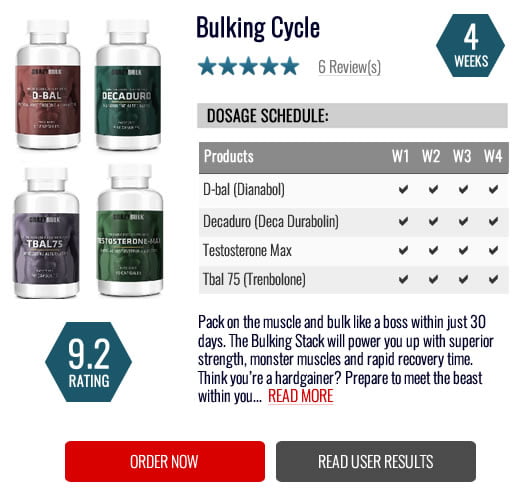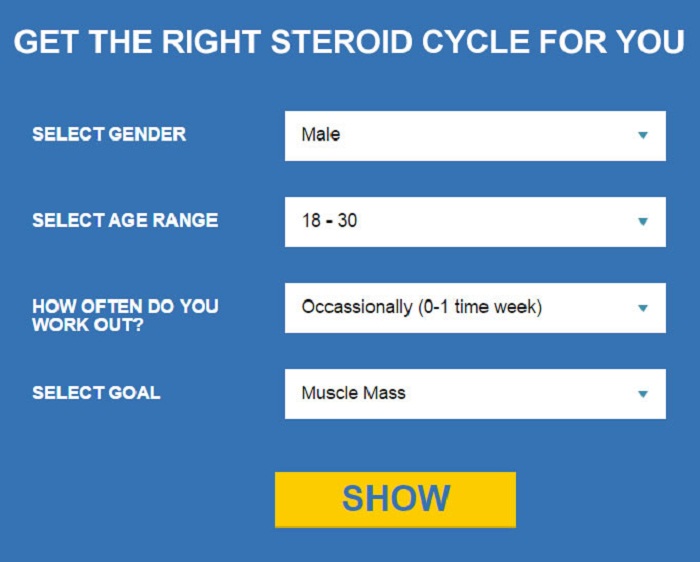Deca vs NPP
Contents
When navigating the complex world of anabolic steroids for bulking, the decision-making process becomes crucial. Deca Durabolin (nandrolone decanoate) and NPP (nandrolone phenylpropionate) stand out as popular choices for individuals seeking substantial muscle gains. This in-depth exploration will delve into the nuances of these compounds, examining Deca vs NPP (similarities and differences), also the factors influencing the decision-making process for those pursuing optimal bulking results.
Must Check: Ultimate Guide to Deca-Durabolin Dosage
Deca Durabolin (Nandrolone Decanoate)
Deca Durabolin, a staple in the bodybuilding community, is renowned for its slow-acting, enduring effects. It belongs to the nandrolone family and is characterized by its attachment to the decanoate ester, providing an extended half-life. The following features make Deca a compelling option for those pursuing muscle mass accrual during bulking cycles:
- Long Half-Life: Deca’s half-life of approximately 15 days distinguishes it for its infrequent dosing requirements. Users appreciate the convenience of fewer injections while experiencing sustained anabolic effects.
- Joint Support: Notably, Deca is recognized for its potential to alleviate joint pain and improve overall joint health. This unique characteristic can be a game-changer for individuals with pre-existing joint issues or those looking to safeguard their joints during intense training.
- Muscle Growth: The primary goal of any bulking cycle is muscle growth, and Deca excels in this regard. Through enhanced nitrogen retention and collagen synthesis, users often report significant gains in both muscle mass and connective tissue health.
- Mild Side Effects: While no anabolic steroid is without potential side effects, Deca is often considered milder than some of its counterparts. Users may experience fewer estrogenic effects, making it a viable option for those concerned about side effect profiles.
- Metabolism and Protein Synthesis: Deca aids in promoting a positive nitrogen balance, facilitating enhanced protein synthesis and metabolism. This metabolic boost contributes to efficient muscle recovery and growth.
Nandrolone Phenylpropionate (NPP)
NPP, the shorter-acting sibling of Deca, is distinguished by its attachment to the phenylpropionate ester. This modification results in a faster release into the bloodstream and a shorter half-life compared to Deca Durabolin. Here are the key characteristics of Nandrolone Phenylpropionate:
- Shorter Half-Life: NPP’s shorter half-life, approximately 3-4 days, necessitates more frequent injections compared to Deca. Users seeking quicker onset and the ability to adjust their cycles more rapidly may find this appealing.
- Quick Onset: The shorter ester of NPP allows for a faster onset of action, making it suitable for those desiring more immediate results. This can be advantageous for individuals looking to kickstart their bulking cycles with prompt anabolic effects.
- Less Water Retention: NPP is often associated with less water retention compared to Deca. This characteristic may be preferable for individuals aiming for a leaner, more aesthetic physique during bulking, where excess water retention can be a concern.
- Versatility: The shorter ester of NPP provides users with greater control over the timing of their cycles. This versatility is appealing to those who prefer a more adaptable approach to their anabolic steroid use.
- Reduced Detection Time: Athletes subject to anti-doping testing may opt for NPP due to its shorter detection time compared to Deca. This consideration is crucial for those navigating competitive sports and stringent testing protocols.
Choosing Between Deca and NPP

The decision between Deca and NPP hinges on various factors, and understanding individual preferences, goals, and tolerance to potential side effects is paramount. Let’s explore additional aspects to consider when making this crucial decision:
- Androgenic Effects: While both compounds are derived from nandrolone, they exhibit different androgenic effects. Deca is often considered milder, while some users report that NPP may induce more noticeable androgenic effects. Assessing personal tolerance to androgenic activity is crucial for minimizing unwanted side effects.
- Dosage and Frequency: Deca’s longer half-life allows for less frequent injections, which may be preferable for users averse to regular injections. On the other hand, individuals comfortable with more frequent injections may find NPP’s shorter half-life and quicker clearance from the body appealing.
- Estrogenic Effects: Although both compounds can aromatize, leading to potential estrogenic effects, users often report that Deca is less likely to cause such issues. Monitoring estrogen levels and incorporating aromatase inhibitors if necessary is crucial for managing these effects.
- Water Retention: Deca is associated with a higher likelihood of water retention compared to NPP. Individuals prioritizing a leaner, more aesthetic look during their bulking cycles may lean toward NPP for its reputed ability to minimize water retention.
- Recovery and Joint Health: Deca’s reputation for promoting joint health and aiding in recovery is a significant consideration for those with joint concerns or a history of injuries. NPP, while still providing some benefits, may not be as pronounced in this regard.
- Personal Experience: Anecdotal evidence and personal experiences play a substantial role in the decision-making process. Engaging with the bodybuilding community, consulting with experienced users, and considering individual responses to each compound contribute to a well-informed choice.
Understanding Side Effects
Both Deca and NPP, like all anabolic steroids, carry potential side effects. Users must be aware of the following considerations:
- Cardiovascular Risks: Anabolic steroids can impact cardiovascular health, with potential effects on cholesterol levels and blood pressure. Regular cardiovascular monitoring and a heart-healthy lifestyle are imperative.
- Hormonal Imbalances: Steroid use can disrupt the body’s natural hormonal balance. Post-cycle therapy (PCT) is essential to help restore natural testosterone production and mitigate the risk of hormonal imbalances.
- Liver Health: While neither Deca nor NPP is known for causing severe liver toxicity, users should prioritize liver health through responsible use and regular check-ups.
- Psychological Effects: Androgenic steroids can affect mood and behavior. Individuals with a history of mental health issues should approach steroid use with caution and under the guidance of a healthcare professional.
Deca vs NPP for Bulking Cycles
Beyond the characteristics of Deca and NPP, several practical considerations contribute to the success of a bulking cycle:
- Training Program: An effective training program tailored to individual goals is crucial for maximizing the benefits of anabolic steroid use. Progressive resistance training and adequate rest are fundamental components.
- Nutrition: Proper nutrition, with a focus on caloric surplus and macronutrient balance, is essential for fueling muscle growth during a bulking cycle. A diet rich in protein, carbohydrates, and healthy fats supports optimal results.
- Supplementation: While anabolic steroids provide a significant anabolic stimulus, appropriate supplementation enhances overall health and performance. Consider incorporating vitamins, minerals, and essential nutrients to address potential deficiencies.
- Monitoring Health Markers: Regular health check-ups, including blood work, cardiovascular assessments, and hormone panels, provide crucial insights into the impact of steroid use on overall health. Monitoring these markers allows for timely adjustments to minimize potential risks.
- Post-Cycle Therapy (PCT): A well-structured PCT plan is vital for restoring natural hormone production and preventing the suppression of endogenous testosterone. This phase is essential for maintaining gains and safeguarding long-term health.
Conclusion
In the intricate decision-making process of choosing between Deca and NPP for bulking, there is no one-size-fits-all answer. Each compound presents unique characteristics that cater to different preferences and goals. The synthesis of scientific knowledge, anecdotal evidence, and personal experiences guides individuals toward an informed decision.
An essential aspect of responsible steroid use is a commitment to health, both in the short term and long term. Before initiating any steroid cycle, consulting with a knowledgeable healthcare professional is imperative. This ensures an understanding of individual health considerations, potential risks, and the development of a comprehensive plan to mitigate adverse effects.
In conclusion, the journey of bulking with anabolic steroids requires a holistic approach, combining the selection of appropriate compounds with a strategic training regimen, proper nutrition, and vigilant health monitoring. By prioritizing both short-term gains and long-term well-being, individuals can navigate the complexities of Deca vs NPP and embark on a bulking journey with a comprehensive and informed perspective.
Frequently Asked Questions (FAQs) on Deca vs NPP:
Q: What are the primary differences between Deca and NPP in terms of chemical structure and administration?
A: Deca Durabolin (nandrolone decanoate) has a longer ester (decanoate), resulting in a prolonged half-life, while NPP (nandrolone phenylpropionate) has a shorter ester (phenylpropionate), leading to a shorter half-life and the need for more frequent injections.
Q: Which compound is better for users concerned about water retention during bulking cycles?
A: NPP is often considered more favorable for those looking to minimize water retention compared to Deca. The shorter ester of NPP may contribute to a leaner and less bloated appearance.
Q: How do Deca and NPP differ in terms of onset of action and cycle duration?
A: NPP generally has a quicker onset of action due to its shorter half-life, making it suitable for users who want to experience results sooner. Deca, with its longer half-life, requires a more extended cycle duration.
Q: Do both Deca and NPP have similar benefits for joint health?
A: While both compounds offer benefits for joint health, Deca is often favored for its more pronounced effects in alleviating joint pain and improving overall joint function, making it an attractive choice for users with joint concerns.
Q: Can NPP be a more suitable option for athletes subject to anti-doping testing due to its shorter detection time?
A: Yes, athletes may prefer NPP over Deca due to its shorter detection time. NPP clears the system more rapidly, reducing the risk of detection during anti-doping tests.
Q: Are there differences in androgenic effects between Deca and NPP?
A: Some users report that NPP may have more noticeable androgenic effects compared to Deca. Individual tolerance to androgenic activity should be considered when choosing between the two compounds.
Q: How do users typically adjust their dosages for Deca and NPP, considering their different half-lives?
A: Deca users typically administer less frequent, higher-dose injections due to their longer half-life, while NPP users often opt for more frequent, lower-dose injections to maintain stable blood levels.
Q: Are there notable differences in recovery times between Deca and NPP?
A: Deca is renowned for its potential to enhance recovery, especially in terms of joint and connective tissue recovery. While NPP also provides benefits, Deca may be preferred for those prioritizing extensive recovery support.
Q: Can estrogenic effects be a concern with both Deca and NPP and how are they managed?
A: Both compounds have the potential to aromatize, leading to estrogenic effects. Users may incorporate aromatase inhibitors to manage estrogen levels and mitigate the risk of associated side effects.
Q: How should users approach post-cycle therapy (PCT) after completing a cycle with Deca or NPP?
A: PCT is essential after any steroid cycle to restore natural hormone production. Strategies may include the use of selective estrogen receptor modulators (SERMs) like tamoxifen or clomiphene to stimulate testosterone production.
Q: Can Deca or NPP be used for cutting cycles, or are they primarily suited for bulking?
A: While both compounds are often associated with bulking cycles, they can be used in cutting cycles as well. However, users should carefully manage dosages, diet, and other factors to achieve their desired goals during cutting phases.
Q: How do users manage potential side effects like cardiovascular risks associated with Deca and NPP use?
A: Monitoring cardiovascular health through regular check-ups, maintaining a heart-healthy lifestyle, and managing cholesterol levels through diet and exercise are essential strategies for minimizing cardiovascular risks.
In summary, these frequently asked questions provide additional insights into the nuances of choosing between Deca and NPP for different bodybuilding goals. Individual preferences, tolerance to side effects, and specific objectives will play key roles in determining which compound aligns better with an individual’s needs.




